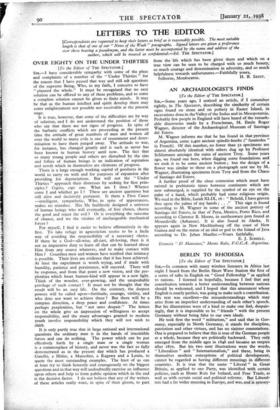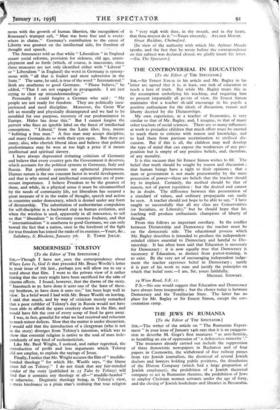BERLIN TO RHODESIA
[To the Editor of THE SPECTATOR.]
Sta,—In common with many wireless listeners in Africa last night I heard from the Berlin Short Wave Station the first of a series of talks in English on " Good Fellowship " as applied to nations. I listened in hopefully, because I feel that any contribution towards a better understanding between nations should be welcomed, and I hoped that this announcer whose English is nearly perfect, was going to make such a contribution. His text was excellent—the misunderstandings which may arise from an imperfect understanding of each other's speech. But his illustrations were of a kind to make one feel, despair- ingly, that it is impossible to be " friends " with the present Germany without being false to our own ideals.
He took first the word " militarism," and said that in Ger- many, especially in North Germany, it stands for discipline, patriotism and other virtues, and has no sinister connotations. One is prepared to believe that this is true of the German people as a whole, because they are politically backward. They only emerged from the middle ages in 1848 and became an empire after 187o. But his two next illustrations were the words, " Liberalism " and " Internationalism," and these, being in themselves modern conceptions of political development, cannot be regarded as having different meanings in different countries. It is true that the name " Liberal " in Great Britain, as applied to one Party, was identified with certain policies, such as Home Rule for Ireland, and Free Trade, as well as with certain social and political reforms. But Liberal- ism had a far wider meaning in Europe, and was, and is synony- mous with the growth of human liberties, the recognition: of Rousseau's trumpet call, " Man was born free and is every- where in chains." Germany's contribution to the cause of Liberty was greatest on the intellectual side, for freedom of thought and speech.
The Announcer told us that while Liberalism " in- England meant social reforms, provision for sickness, old age, unem- ployment and so forth (which, of course, is inaccurate, since these measures are not only identified either with " Liberal " or " Liberalism " in England) the word in Germany is synony- mous with " all that is foulest and most subversive in the State." The same, he said, is true of the word " International." Both are anathema to good Germans. " Please believe," he added, " That I am not engaged in propaganda.- I am just trying to clear up misunderstandings."
Personally I could forgive a German who said : " My people are not ready for freedom. They are politically inex- perienced and need discipline. Moreover, the Great War left us morally and physically disintegrated and we had to be moulded for one purpose, recovery of our predominance in Europe. Hitler has done this." But I cannot forgive the perveit who fixes an ignoble label on the finest of intellectual conceptions. " Liberal," from the Latin liber, free, means " befitting a free man." A free man may accept discipline, and many Germans do so with their eyes open. But there are many, also, who cherish liberal ideas and believe that political predominance may be won at too high a price if it means intellectual and spiritual slavery.
I have always deprecated irritating criticism of Germany and believe that every country gets the Government it deserves, which accounts for the political systems in Germany, Italy and Russia. But political systems are ephemeral phenomena. Human nature is the one constant factor in world development, and that is why moral and intellectual conceptions are of para- mount importance. I believe Freedom to be the greatest of these, and while, in a physical sense it must be circumscribed by the needs of community life, yet liberalism has secured a great measure of it in the realm of thought, speech and action in countries under democracy, which is denied under any form of dictatorship. The substitution of authoritarian compulsion for self-discipline is a backward step in human evolution, and when the wireless is used, apparently in all innocence, to tell us that " liberalism " in Germany connotes foulness, and that " internationalism " is anathema to good Germans, we can only bewail the fact that a nation, once in the forefront of the fight for true freedom has joined the ranks of its enemies.—Yours, &c., Salisbury, S. Rhodesia, January 5th. E. TAWSE JOLLIE.















































 Previous page
Previous page